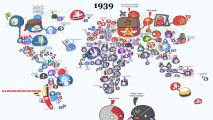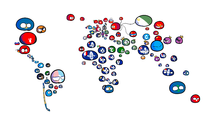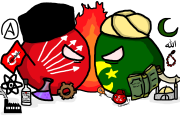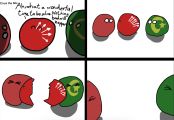No edit summary |
No edit summary |
||
| Line 20: | Line 20: | ||
|caption=Ne mutlu Türküm diyene! | |caption=Ne mutlu Türküm diyene! | ||
|song=[https://www.youtube.com/watch?v=kxyifJ2ELD8 İzmir Marşı] | |song=[https://www.youtube.com/watch?v=kxyifJ2ELD8 İzmir Marşı] | ||
[https://www.youtube.com/watch?v=tfKFFlRVYGY Gençlik Marşı] | |||
Important Note: The "Gençlik Marşı" was used only in 1947. It has been used for 70 days. | |||
|founder=Mustafa Kemal Atatürk (1881-1938) | |founder=Mustafa Kemal Atatürk (1881-1938) | ||
|likes= | |likes= | ||
Revision as of 22:46, 13 May 2021
Kemalism, also called Ataturkism, is a left-wing, nationalist, secular and culturally rather progressive ideology inhabiting a moderate position in the authoritarian left quadrant. and is the ideology of Mustafa Kemal Atatürk. It essentially advocates for a progressive, nationalist social democracy and can be seen as a more moderate version of ![]() Left-Wing Nationalism, especially on the economic axis. It has a strong cult of personality in Turkey since its foundation.
Left-Wing Nationalism, especially on the economic axis. It has a strong cult of personality in Turkey since its foundation.
The six arrows of Kemalism represent ![]() Republicanism,
Republicanism, ![]() Populism,
Populism, ![]() Nationalism,
Nationalism, ![]() Laicism (exclusion of ecclesiastical control and influence),
Laicism (exclusion of ecclesiastical control and influence), ![]() Statism and
Statism and ![]() Reformism.
Reformism.
History
Kemalism is the ideology of Mustafa Kemal Atatürk and the founding ideology of the Republic of Turkey. The ideology was designed to help modernize Turkey and separate it from its Ottoman predecessor, these reforms include democracy, secularism, state support of the sciences and free education.
The early roots of the ideology began during the early 19th-century Tanzimant reforms in the late years of the Ottoman Empire when the Empire was trying to stop its collapse, of course this merely delayed the inevitable. After the Young Ottoman movement ditched Ottoman Nationalism (![]() Ottomanism) to stop the rising ethnic nationalism within the Empire in favour of Turkish nationalism becoming the Young Turks (no, not the American news tabloid) which sought to establish many things the Young Ottomans wanted established like a democracy however unlike the Young Ottomans, the Young Turks were in favour of secularism. The Young Turks inspired Atatürk greatly with their advocacy of democracy, Turkish nationalism and secularism among other things. After the collapse of the Ottoman Empire and the subsequent establishment of the Republic of Turkey in 1923, Atatürk implemented these ideas as well as bringing about more economically left reforms to the nation which the nation had never experienced before.
Ottomanism) to stop the rising ethnic nationalism within the Empire in favour of Turkish nationalism becoming the Young Turks (no, not the American news tabloid) which sought to establish many things the Young Ottomans wanted established like a democracy however unlike the Young Ottomans, the Young Turks were in favour of secularism. The Young Turks inspired Atatürk greatly with their advocacy of democracy, Turkish nationalism and secularism among other things. After the collapse of the Ottoman Empire and the subsequent establishment of the Republic of Turkey in 1923, Atatürk implemented these ideas as well as bringing about more economically left reforms to the nation which the nation had never experienced before.
Beliefs
Kemalism is defined by having six principles, which are notably represented in its symbol with the six arrows.
 Republicanism
Republicanism
Republicanism or in Turkish "cumhuriyetçilik" is the belief that civic power within society should be held within ![]() democratically elected representatives, instead of passed down through the generations like in a
democratically elected representatives, instead of passed down through the generations like in a ![]() monarchy of the Ottoman Empire. Though it also banned earlier opposition parties because of "saving the secular state"
monarchy of the Ottoman Empire. Though it also banned earlier opposition parties because of "saving the secular state"
The Kemalist republic is a unitary state favoring centralization.
 Nationalism
Nationalism
Nationalism or in Turkish "Milliyetçilik" in the Kemalist context refers to the belief in a single Turkish nation unified under a ![]() Rousseauian social contract. This form of Nationalism is very much
Rousseauian social contract. This form of Nationalism is very much ![]() Civic, believing that to be Turkish one must "Protect and promote the moral, spiritual, cultural and humanistic values of the Turkish Nation.". Kemalist Nationalism also favors a form of Souverainism, rejecting
Civic, believing that to be Turkish one must "Protect and promote the moral, spiritual, cultural and humanistic values of the Turkish Nation.". Kemalist Nationalism also favors a form of Souverainism, rejecting ![]() imperialism and foreign conquest, although it views the nation as inseparable not allowing for secessionism.
imperialism and foreign conquest, although it views the nation as inseparable not allowing for secessionism.
 Populism
Populism
Populism or in Turkish "Halkçılık" is the belief that political power and sovereignty within society should be held by the Turkish people instead of a nobility.
However, the concept of "people" here is not in a left-wing or right-wing "populist" sense. It is ideologized by "solidarist corporatism" (or corporate solidarism) originating from the Third French Republic. It is against the class struggle and supports the cooperation of the professions. However, there were no corporations established in Kemalist Turkey. The Republican Peoples Party program is theoretically divided "people" into professions. The aim here is to create a united nation that does not discriminate "class, race, religion and gender".
Because of this similarity, the Republican People's Party was invited by the Radical Republican Party to the International Understanding of Radical Parties and Similar Democratic Parties (Entente Internationale des Partis Radicaux et des Partis Démocratiques Similaires) in 1926.
Şükrü Kaya, Atatürk's Minister of Interior, stated the following in the official newspaper dated February 13, 1937:
Friends; There are various kinds of organizations called populism on earth. Joint work of leftist ideas in recent timesand called the popular fronts, a number of political we meet the institutions. Our notion of populism has nothing to do with them. The truth of this word is to the party in the first days of the was taken as the name. The populism recipe, which was made in the language of the Great Chef (Mustafa Kemal Atatürk), found its perfection in the party program. This qualification protects dormitory is from pretenses of privilige and class fights. It has great importance protecting.
In the 1931 Republican People's Party (CHP) Program, it was written as follows:
It is one of our main principles to accept the people of the Republic of Turkey as a community that is not made up of separate classes, but as a community that is dedicated to various employees in terms of division of labor for individual and social life.
A) Small farmers,
B) Small industrialist and shopkeepers,
C) Workers
Ç) Self-employed person,
D) Industrialists, large land and business owners, and merchants.
They are the main working groups that constitute the Turkish community. The work of each of them is essential for the life and happiness of the other and the general community. The purpose of our party with this principle is to ensure social order and solidarity instead of class struggle and to establish harmony in interests in a way that does not distort each other. Benefits are proportional to ability and degree of work.
The aim is "to build a cohesive mass without privileges, without classes."
Within the scope of this principle, from 1935 onwards, "Spring and Flower Day" was celebrated as a national holiday instead of May 1 Labor Day. May 1 is a holiday. However, instead of supporting the class struggle, a national holiday was declared.
However, a compromise between workers and bosses is stipulated. For this reason, good rights have been provided to the workers and job security to the bosses. Thus, the class struggle was wanted to be prevented. However, Kemalism is not fascism. It does not have a fascist corporatist understanding. His understanding is a solidarist corporatist.
Strikes and lockouts are prohibited. The aim is to create a unified nation. Workers and bosses are required to be "civic nationalists". In the program of the Republican People's Party of 1931, it is stated as follows:
"We will take into account the rights and interests of nationalist Turkish workers. Establishing harmony between labor and capital, and imposing appropriate provisions with a labor law, are among his important jobs."
Within the scope of this principle (Kemalist populism), "Spring and Flower Day" was celebrated as a national holiday instead of May 1, Labor Day since 1935. May 1 is a holiday. However, instead of a holiday representing the working class, it was declared a national holiday.
 Statism
Statism
Statism or in Turkish "devletçilik" is the belief that the state should actively intervene within the economy and society to solve issues, this principle aligns Kemalist economic policy as leaning towards ![]() Social Democracy favouring a large welfare state.
Social Democracy favouring a large welfare state.
 Laicism
Laicism
Laicism, also called secularism and in Turkish "Laiklik" is the belief that religion should be separated from all forms of public life. What separates Kemalist laicism from how secularism is practiced in most western countries is the focus on not only separating the church (or rather mosque) from the state, but also from society in general, seeking to make religion a personal affair. This principle aligns Kemalist social policy as being culturally rather left-wing.
 Reformism
Reformism
Reformism, also called Revolutionism and in Turkish "inkılâpçılık" is the belief that the Turkish Society and the Kemalist philosophy should seek to actively reinvent and modernize to fit with the modern times and not to cling on the oppressive institutions of the past. This principle aligns also aligns Kemalist social policy as being culturally rather left-wing
How to Draw
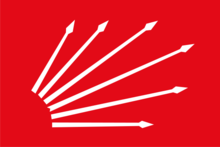
Kemalism's design is based of the "Six Arrows" symbol, which represents the six principles of the ideology. The symbol is used by the Government of Turkey and the Republican People's Party of Turkey.
- Draw a ball with eyes.
- Fill it with red.
- Draw 6 white arrows coming from the bottom left corner.
And you're done!
Relations
Friends
 Longism - A bit too religious but he's cool otherwise.
Longism - A bit too religious but he's cool otherwise. Social Democracy - Best economic system.
Social Democracy - Best economic system. Left-Wing Nationalism - Turkey stronk.
Left-Wing Nationalism - Turkey stronk. Civic Nationalism - Together against ethnats and racenats.
Civic Nationalism - Together against ethnats and racenats. Tridemism
Tridemism  - Fellow Modernist.
- Fellow Modernist. Social Authoritarianism - The state must secure the well-being of the people!
Social Authoritarianism - The state must secure the well-being of the people! Laicism - Religion and state MUST be separate!
Laicism - Religion and state MUST be separate!
Frenemies
 Paternalistic Conservatism - Good economics and nationalism, bad social policies.
Paternalistic Conservatism - Good economics and nationalism, bad social policies. Leninism - Thanks for helping me in the Turkish war of independence. Although Communism isn't great.
Leninism - Thanks for helping me in the Turkish war of independence. Although Communism isn't great. Pancasila - He is pretty close to me and
Pancasila - He is pretty close to me and  Tridemism. But I don't like how religious he is.
Tridemism. But I don't like how religious he is. Welfare Chauvinism - I like your economic policies, but
Welfare Chauvinism - I like your economic policies, but  Ultranationalism is stupid.
Ultranationalism is stupid.  Civic Nationalism is the best type of Nationalism!
Civic Nationalism is the best type of Nationalism! Venizelism - I know you're annoyed about the whole Izmir incident, but we're cool now, right?
Venizelism - I know you're annoyed about the whole Izmir incident, but we're cool now, right? Metaxism - Right?
Metaxism - Right?
Enemies
 Islamic Theocracy - No.
Islamic Theocracy - No. Neo-Ottomanism - LOOK HOW HE MASSACRED MY BOY!
Neo-Ottomanism - LOOK HOW HE MASSACRED MY BOY! Ultranationalism - You are the biggest ally of
Ultranationalism - You are the biggest ally of  Neo-Ottomanism. Fuck you!
Neo-Ottomanism. Fuck you! Jihadism - Fuck off, Islamic terrorist!
Jihadism - Fuck off, Islamic terrorist! Imperialism - SHOO BRI'ISH!
Imperialism - SHOO BRI'ISH! Anationalism - BAS....wait, I thought you were called Anatolianism for a second. Nevermind, you suck.
Anationalism - BAS....wait, I thought you were called Anatolianism for a second. Nevermind, you suck. National Socialism - I don't care you admired me, you are a genocidal scum!
National Socialism - I don't care you admired me, you are a genocidal scum!
Further Information
Literature
- Nutuk by Ataturk
- Ataturk: The Biography of the Founder of Modern Turkey by Andrew Mango
- Turkish Foreign Policy: Islam, Nationalism and Globalization by Hasan Kosebalaban
- Ataturk: An Intellectual Biography by Sukru Hanioglu
Wikipedia
- Mustafa Kemal Atatürk
- Kemalism
- Republican People's Party
- Ataturk's Cult of Personality
- Ataturk's Reforms
Videos
Online Communities
Gallery
-
Credit: u/duy_physics, Source
-
Credit: OzymndiasFR
-
Credit: bruno-radical, Source
-
Shame
-
kemalism vs islamic theocracy
-
Rough day for kemalism
 | |
| {{{name}}} | |
|---|---|
| Societal Information | |
| Historical Information | |
| [Source] |
